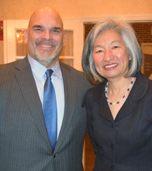Feb. 10, ’17 NASCUS Report
Posted February 10, 2017In letter to McWatters, collaboration sought
Supplemental capital and an easily understood overhead transfer rate (OTR) methodology are two issues the state credit union system looks forward to working on with new Acting NCUA Chairman J. Mark McWatters, NASCUS said in a congratulatory letter to the new leader this week. Additionally, NASCUS President and CEO Lucy Ito outlined seven other issues of interest that the state system is ready to assist the new acting chairman in addressing – including whether the agency’s risk-based capital rule should be revisited, and the establishment of a “credit union advisory council” at the agency.
On supplemental capital (which the agency has addressed in an advance notice of proposed rulemaking (ANPR) published this week; see following item), Ito noted that NASCUS has long supported the authority for credit unions, and noted that 15 states permit it for their credit unions. “In addition, with their experience supervising a variety of banking and securities industries in addition to credit unions, state regulators will be a valuable resource as NCUA moves forward with capital reform,” she wrote. Regarding OTR methodology and transparency, Ito said the state system looks forward to NCUA completing the public comment process that was initiated last year, and stands ready to work with the agency toward shared objectives of greater transparency and an easily comprehended OTR methodology. “We also urge the NCUA board to retain its important responsibility of budgetary oversight and its fiduciary responsibility to the fund by not delegating OTR implementation authority to agency staff,” she added.
The NASCUS leader also listed seven additional areas in which the state system is “well positioned to assist” the new, acting chairman of the federal credit union agency. Those areas are:
- Risk-based capital rule, and re-engaging on the rule’s merits;
- Establishment of a “Credit Union Advisory Council” at the agency, noting that 22 out of 45 states already do so, and which generate “common sense solutions that simultaneously assure appropriate safety measures and foster credit union growth;”
- Adoption of “S” (for “sensitivity” to market risk) in the CAMEL rating system – which 16 states have already also done;
- Greater fraud prevention and detection cooperation between states and the federal agency;
- Drawing FASB recognition of CU differences, as many state regulators supervise both credit unions and banks (and can readily observe the CU difference that may be discounted by the accounting standards group);
- Working with Congress on any updates to Title II of the Federal Credit Union Act;
- Consolidate rules applicable to federally insured, state chartered credit unions (FISCUs) to make it easier for credit unions and state and federal examiners to understand the rules that apply.
LINK:
Text of Ito letter to Acting NCUA Board Chairman Mark McWatters
ALTERNATIVE CAPITAL PROPOSAL PUBLISHED; COMMENTS DUE MAY 9
Comments are due May 9 about a proposed rule on alternative capital for credit unions, as published this week in the Federal Register. The comment period is 90 days. The NCUA Board voted to issue the proposal at its Jan. 19 meeting (the day before President Donald Trump was sworn into office). On his inauguration day, however, the newly installed president signed a freeze on all new federal regulations – including those sent by federal agencies to the Register for publication (like the alternative capital proposal), but not yet published. After two weeks of review, NCUA declared last week that it is an “independent agency,” and is thus not subject to the regulatory freeze (although the agency said it would adhere to the spirit of the memo). Additionally, Trump on Jan. 26 designated Mark McWatters as acting chairman of the agency – which also helped to advance the proposal. Under the freeze order, the White House stipulated that federal agencies “send no regulation to the Office of the Federal Register (the “OFR”) until a department or agency head appointed or designated by the President after noon on January 20, 2017, reviews and approves the regulation.” As McWatters was a presidential designee, he met that stipulation. Also this week: the new field of membership rule for federal credit unions went into effect (and was not subject to a 60-day postponement under the freeze).
NASCUS is developing a summary of the ANPR on alternative capital
LINK:
Notice of ANPR by NCUA on Alternative Capital
‘1-FOR-2’ RULE DOES NOT INCLUDE NCUA (BUT COST SAVINGS ENCOURAGED)
Independent federal agencies – such as NCUA — are not covered under the ‘1-for-2’ regulatory-reduction order signed by President Trump last week, confirming earlier reports. In interim guidance issued by the Office of Management and Budget (OMB) this week, the White House clarified that “significant actions” by the independent agencies are not covered under the order, which requires that, for every new federal regulation proposed, two must be eliminated before the regulation may be finalized. The rule also requires that the cost of any new rule is offset by the costs offset by the elimination of old rules. The guidance, dated Feb. 2, addresses in a question and answer format whether independent agencies are covered by the order. “No, the requirements of Section 2 apply only to those agencies required to submit significant regulatory actions to (OMB’s Office of Office of Information and Regulatory Affairs (OIRA)) for review under EO 12866 (Trump’s order). Nevertheless, we encourage independent regulatory agencies to identify existing regulations that, if repealed or revised, would achieve cost savings that would fully offset the costs of new significant regulatory actions.”
LINK:
OMB guidance on ‘1-for-2’ regulation order
NO SURPRISE: ANALYSIS EXPECTS REGULATORY ORDER TO ‘IMPACT’ TREASURY, FSOC MEMBERS
Meanwhile, the OMB released an analysis this week of the agencies it expects would be “impacted” by Trump’s Feb. 3 executive order, “Core Principles for Regulating the U.S. Financial System.” “The agencies anticipated to be impacted by this executive order include the Department of the Treasury and member agencies of the Financial Stability Oversight Council,” the analysis states. NCUA is a member of the FSOC, as well as CFPB, FDIC, Federal Reserve and OCC. The budgetary impact analysis (signed by Acting OMB Director Mark Sandy) asserts that implementing the order would have a de minimus impact on both the costs and revenues to the federal government, as well as mandatory and discretionary obligations and outlays. Sandy’s analysis covers the “5-fiscal year period” beginning in 2017.
HOUSE LEADER CALLS FOR FIRING CORDRAY, TRANSFERRING CONSUMER OVERSIGHT
President Trump should fire CFPB Director Richard Cordray, and appoint a new director who could “first undo all harmful actions taken by the CFPB during the Obama era,” House Financial Services Committee Chairman Jeb Hensarling (R-Texas) wrote in the Wall Street Journal Thursday. Hensarling also suggested that Congress could transfer the agency’s consumer protection role to the Federal Trade Commission (FTC) or “back to traditional banking regulators, where it resided before the CFPB’s creation.” He wrote that the agency must be functionally terminated, and recommended that consumer protection can instead come through an “accountable and constitutional process.” Meanwhile, a memo outlining legislative goals regarding the future of the CFPB — purportedly emanating from Hensarling’s committee — was circulating in Washington last week. Reportedly, the memo calls for stripping the agency of many of its powers, including eliminating its consumer complaint database, scaling back its enforcement abilities, but keeping a single director (rather than a five-member board, as Hensarling had proposed last year in his Financial CHOICE Act bill).
OH, KY AGENCIES EARN REACCREDITATION FROM NASCUS
Reaccreditation for state credit union regulatory agencies in Kentucky and Ohio has been approved by NASCUS, following the two agencies’ recent five-year reviews. Kentucky has earned its sixth NASCUS accreditation since winning its first in 1992; Ohio has achieved its fourth since its first was awarded in 2001. The Ohio agency earned a joint accreditation with the Conference of State Bank Supervisors (CSBS).
NASCUS’ Ito congratulated both Charles Vice, commissioner of the Kentucky Department of Financial Institutions, and Kevin Allard, interim superintendent of the Ohio Division of Financial Institutions, on earning the certifications. “Being reaccredited is a significant achievement and represents the effectiveness and sound supervision of the state credit union regulatory system,” Ito said. The 24 state-chartered credit unions overseen by the Kentucky regulatory program hold total assets of just more than $3.5 billion. The 139 credit unions supervised by Ohio hold $18.8 billion in assets.
PERFORMANCE STANDARDS PANEL WORKING ON REVIEW, UPDATE
NASCUS Performance Standards Committee (PSC) met by phone this week for its first committee meeting of year, moving forward to comprehensively review and update the overall accreditation program. Nationwide, nearly 86% of state-chartered credit union assets are supervised by NASCUS’ 27 accredited state agencies. NASCUS accreditation is valid for a five-year period subject to annual review, which enables the accredited agency and the PSC to measure progress and improvement. To earn accreditation, an agency’s qualifications are evaluated by an Accreditation Review Team (ART), which completes a thorough examination of the agency’s accreditation application and supporting documents, followed by three days of intense on-site scrutiny of agency programs and performance.
CYBERSECURITY’S STICKLEY ON SECURITY ON NBC’S TODAY SHOW
 Jim Stickley, the keynote speaker for the NASCUS/CUNA 2017 Cybersecurity Symposium – June 5-6 in San Diego – made yet another appearance on NBC’s “Today Show” Thursday morning, discussing how to avoid hacking of computers with “smart strategies.” Stickley (a widely known cybersecurity expert of the firm “Stickley on Security”) has made numerous appearances on the program over the years, discussing a wide variety of cybersecurity issues (on Thursday he appeared on the show’s “Today’s Take” segment). The 2017 Cybersecurity Symposium is a two-day event that features examination and discussion of cutting-edge techniques and best practices and procedures that protect organizations from the latest threats. The 2017 edition of this event maintains the momentum built from editions in the previous three years. Other confirmed speakers at the event include Randy Romes of CliftonLarsen, Patrick Sickels of CU*Answers, and NCUA Board Member Rick Metsger.
Jim Stickley, the keynote speaker for the NASCUS/CUNA 2017 Cybersecurity Symposium – June 5-6 in San Diego – made yet another appearance on NBC’s “Today Show” Thursday morning, discussing how to avoid hacking of computers with “smart strategies.” Stickley (a widely known cybersecurity expert of the firm “Stickley on Security”) has made numerous appearances on the program over the years, discussing a wide variety of cybersecurity issues (on Thursday he appeared on the show’s “Today’s Take” segment). The 2017 Cybersecurity Symposium is a two-day event that features examination and discussion of cutting-edge techniques and best practices and procedures that protect organizations from the latest threats. The 2017 edition of this event maintains the momentum built from editions in the previous three years. Other confirmed speakers at the event include Randy Romes of CliftonLarsen, Patrick Sickels of CU*Answers, and NCUA Board Member Rick Metsger.
LINKS:
Jim Stickley on Today Show’s “Today’s Take”
2017 Cybersecurity Symposium agenda, speakers, registration, hotel info – and more
BRIEFLY: NASCUS on the road in KY, MD
 NASCUS was on the road again this week, in conjunction with the Directors’ College and Executive Forum in Versailles, Ky., and at a Maryland-District of Columbia Credit Union Association (MDCCUA) gathering in Annapolis, Md. Credit union directors and executive staff turned out at the Kentucky event (co-sponsored by NASCUS, the Kentucky Department of Financial Institutions and the Kentucky Credit Union League). Among the topics addressed: the Military Lending Act, exam issues, BSA and financial literacy (in photo: participants at the KY event follow along in the session) … Meanwhile, NASCUS President and CEO Lucy Ito visited with the MDCCCUA at an event in Maryland’s state capital of Annapolis, where local issues and national issues related to the state credit union system were discussed. (In photo: MDDCCUA President and CEO John Bratsakis and NASCUS President and CEO Lucy Ito.)
NASCUS was on the road again this week, in conjunction with the Directors’ College and Executive Forum in Versailles, Ky., and at a Maryland-District of Columbia Credit Union Association (MDCCUA) gathering in Annapolis, Md. Credit union directors and executive staff turned out at the Kentucky event (co-sponsored by NASCUS, the Kentucky Department of Financial Institutions and the Kentucky Credit Union League). Among the topics addressed: the Military Lending Act, exam issues, BSA and financial literacy (in photo: participants at the KY event follow along in the session) … Meanwhile, NASCUS President and CEO Lucy Ito visited with the MDCCCUA at an event in Maryland’s state capital of Annapolis, where local issues and national issues related to the state credit union system were discussed. (In photo: MDDCCUA President and CEO John Bratsakis and NASCUS President and CEO Lucy Ito.)

For more information about NASCUS's news and/or public relations, please contact our Marketing and Communications Department.